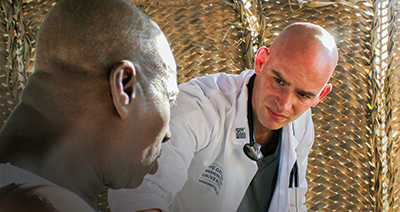In January 2010, a devastating 7.0 magnitude earthquake, centered near the town of Léogâne, struck Haiti. An estimated 3 million people were affected by the catastrophic event. Nearly 2,000 miles away in Massachusetts, Kevin Lombardi, who was active in the engineering field-services industry at the time, saw news coverage of the devastation and felt compelled to do something. “It was a call to action for me,” says Lombardi, who soon after hopped on a plane and volunteered his skills to help the Haitians rebuild.

“One of my jobs was to teach locals how to use concrete properly,” he says. “It was my understanding that people simply weren’t constructing these houses correctly. On the contrary, after a lot of frustration teaching them, I was informed by the locals that while they knew how much cement to put in the concrete, they simply couldn’t afford to buy the cement.”
Through this and other interactions with Haitians, Lombardi realized that throughout the international response to the earthquake, local voices weren’t being heard and local needs weren’t being met, and that this was especially true for residents’ medical needs. “That’s the reason I wanted to become a physician, to focus on service and to challenge the dynamics that create global health inequity,” he says. Intrigued by what he saw in Haiti, Lombardi spent the next year studying how the earthquake affected women’s health. That’s also when he met Marie, whom he describes as the definition of resilience.
“She never knew her father, and her mother died of an illness when she was very young. She knew vividly what it was like to go hungry, to see family ravaged by disease, and to see the little stability that she had shattered with a single shake of the ground. Marie also showed me that it was Haitian people who had the answers to their problems, not us,” he says. Marie helped Lombardi spot the real challenges facing the Haitian population and served as his translator. The couple married in 2011 and have a 4-year-old daughter.
Lombardi, a first-year medical student at the GW School of Medicine and Health Sciences (SMHS), launched YourStory International, a nonprofit organization dedicated to challenging the traditional models of international aid by empowering communities to create their own sustainable social and economic change. Established in 2013, the organization focuses on public health and economic and community development. Lombardi’s work is anchored in Léogâne and Pont Morel, Haiti, where there is little to no access to high-quality primary health care. “The goal is to bring forth a new way of creating development where local perspectives are prioritized, local leadership is empowered, and development is holistic,” says Lombardi, who earned his bachelor’s degree in anthropology and history from the University of Massachusetts.
GW, he explains, was the obvious choice for medical school. “It’s an institution that is molding physicians who want to change the field, like me. It has a reputation for taking global health seriously, as well as being innovative in terms of its curriculum,” he says.
YourStory’s most recent initiative was the creation of the Pont Morel Primary and Emergency Care System. Local practitioners will provide free primary and emergency care for 5,000 people who previously had little access to medical facilities. “We promise every resident one visit with a physician annually,” Lombardi says. “Everyone gets medical records, free medications, and targeted public health education.”
Lombardi is grateful for the support of Lawrence “Bopper” Deyton, M.D. ’85, M.S.P.H., senior associate dean for clinical public health and professor of medicine at SMHS. “I took Dr. Deyton’s idea of giving students a multiday challenge and having them propose ideas to solve a clinical public health problem and used it to train our Haitian nursing students. I tasked them with creating an innovative public health curriculum.”
He adds, “It’s about investing in people where they are, not making them go to a clinic six miles away. It’s a privilege to put on my white coat and have one-on-one contact with the people I serve on a daily basis.”



